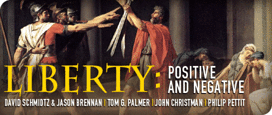Lead Essay
In this month’s lead essay, David Schmidtz and Jason Brennan, drawing on their new book A Brief History of Liberty, expose an alleged myth about liberty: that “negative liberty” is the special concern of classical liberals and libertarians, while “positive liberty” is the special concern of Marxists, socialists, and modern liberals. “The myth is perpetuated,” they argue, “because both sides to this debate make a common assumption: Liberty — whatever that is — is to be promoted by government in a direct way.” Schmidtz and Brennan challenge this assumption, arguing that whether or not government ought to promote liberty of any stripe depends on evidence about how well suited government is to the job. Arguing that disputes over the role of government cannot be settled by an analysis of the meaning of the concept of liberty, Schmidtz and Brennan maintain that “both negative and positive liberty matter. Negative liberty matters in part because it is a highly effective, if imperfect, way of promoting positive liberty.”
Response Essays
In his bracing retort to the lead essay, Cato Senior Fellow Tom G. Palmer says he finds Schmidtz and Brennan’s discussion of liberty “provocative, but not enlightening.” Palmer contends that they misconstrue Isaiah Berlin’s famous distinction between positive and negative liberty, and that to use ‘freedom’ or ‘liberty’ as synonyms for ‘wealth’ or ‘ability’ “generates confusion, rather than clarity.” Freedom, Palmer argues, “is an inherently social concept,” but the having of assets or abilities is not. Wealth is valuable, Palmer says, “but the interesting issue is how wealth is related to liberty, not as species to genus, but as effect to cause.” According to Palmer, Schmidtz and Brennan’s endorsement of a notion of positive liberty “confuses … the relationship between government and freedom” and invites “[t]he elimination of liberalism as a coherent intellectual and political force.”
Princeton philosopher Philip Pettit agrees with Schmidtz and Brennan that “policy-making and institution-building … ought to be informed by empirical research and modeling.” However, Pettit “cannot see why they think this undermines philosophical argument about the merits of adopting one or another conception of freedom as a primary concern of government.” Empirical research can tell us what is feasible, Pettit points out, but it cannot tell us what is desirable. Public political deliberation, Pettit urges, requires a “basis of evaluation that will make sense” to our fellow citizens. A proliferation of different considerations applying in different kinds of cases cuts against “the formation of a society as a community of deliberation,” which Pettit argues depends on their being values of universal concern. Pettit goes on to defend his conception of freedom as “non-domination,” which is “the sort of freedom you enjoy when you are not subject to the will of another agent or agency,” which he contrasts from freedom from interference.
Penn State philosopher John Christman agrees with Schmidtz and Brennan’s claim that disputes over the nature of liberty cannot be settled by conceptual analysis alone, and he applauds their call for historical and empirical work to reveal the likely results of government’s attempts to promote this or that kind of liberty. But Christman warns that “in order to formulate this research project coherently, we will not be able to escape the armchair,” and raises two challenging questions for Schmidtz and Brennan’s approach. First, he asks “how can a determination be made whether a government policy succeeds in increasing liberty without a prior and independent evaluation of the justification of that policy? Second, … why and how is the focus to be solely on the actions of the ‘government’ rather than, say, on other powerful social actors such as economic firms and corporate agents,” which government policy helps define? Christman concludes by suggesting that investigation beyond the armchair will reveal the track record of competitive markets in “in effectively improving the lives of citizens in an equitable and morally acceptable manner” to be one of “obvious and dismal failure.”

